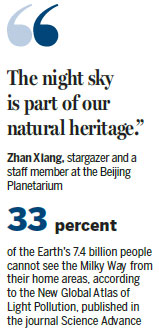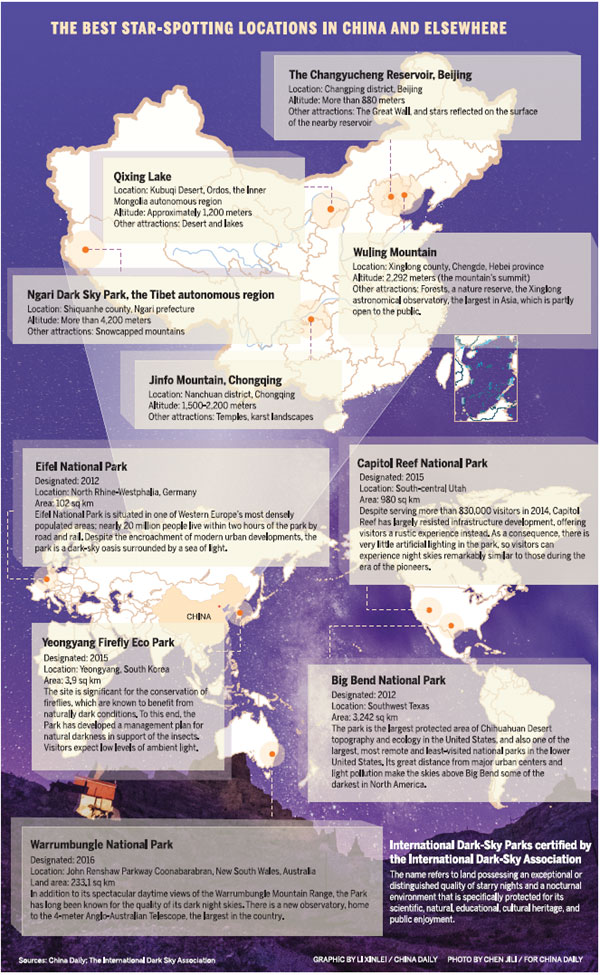Shedding light on China's dark-sky problem
Amateur stargazers complain that their view of the universe is being obscured by the excessive use of artificial lighting in built-up areas. Zheng Jinran reports from Ordos in the Inner Mongolia autonomous region.
The launch of Shenzhou XI on Oct 17 and its subsequent docking with the Tiangong II space lab has reaffirmed the Chinese public's love affair with space exploration and astronomy.
In recent years, the nation's star spotters have converged in increasing numbers on areas that offer unspoiled views of the galaxy, such as the Tibet autonomous region where altitude and lack of heavy industry guarantee clear night skies.
The growth of "night sky tourism" has prompted travel operators to provide a wider range of services catering to the needs of stargazers. For example, Ctrip, one of China's leading travel service providers, offers more than 100 different trips to dark-sky hotspots at home and abroad.

So far this year, more than 10,000 people have taken the company's star-tourism packages, with the younger generation - mainly people born in the 1980s - accounting for the majority of sales, according to Shi Yuduan, the company's chief marketing officer.
However, city-bound amateur astronomers and those on low incomes who are unable to afford trips to dark-sky spots at home and overseas are plagued by light pollution. A recent survey suggests that for many people, a glimpse of the Milky Way or other parts of the visible galaxy is no longer possible as a result of the affects of artificial lighting.
The New Global Atlas of Light Pollution, published in the journal Science Advance, shows that 60 percent of people in Europe and almost 80 percent of North American residents are unable to see the Milky Way. More pertinently for China, it also shows that light pollution makes the nebula invisible to people who live in the areas around Beijing and Hong Kong.
Overall, more than 33 percent of the Earth's 7.4 billion people can no longer see the Milky Way from their home areas, making light pollution a global issue, according to the atlas.
Rising concerns
Frustrated by the bright nights in Beijing, Zhan Xiang, an enthusiastic stargazer, drives hundreds of kilometers during weekends and vacations to view the night sky and revel in childhood memories of watching the stars.
"The night sky is part of our natural heritage. It's a huge loss because it has existed since time immemorial," said the 34-year-old, who works at the Beijing Planetarium popularizing astronomy among young people.
Zhan runs MountainStar, a group that organizes driving trips and events designed to help more people discover the "hidden" galaxy. The group, which was founded in 2010 and has more than 100 members, is now calling for more attention to be paid to the problem of light pollution.
The growing public interest in the universe and concerns about the effects of artificial lighting have been recognized by the central government and related organizations. That has led to strengthened protection of the night skies in recent years.
For example, the China Biodiversity Conservation and Green Development Foundation's Starry Sky Working Committee, which focuses on astronomical research, have established dark-sky parks in Tibet's Ngari and Nagqu prefectures in a bid to protect clear night skies.
"It's the first step in our efforts to prevent the spread of artificial light," said Wang Xiaohua, head of the foundation's star protection branch. "But we need more to make a difference."
So far, none of China's dark-sky parks has been certified by the International Dark-Sky Association, a nongovernmental organization that gives awards to "spaces protected for natural conservation that implement good outdoor light and provide dark sky programs for visitors".
Wang Xiaohua, head of the association's China office, said public interest is growing, but has little real influence at present, which means more governments should support and facilitate efforts to reduce light pollution.
"We plan to establish more parks and reserves around China's megacities, such as in the suburbs of Beijing, as a way of informing the public about light pollution by providing easier accesses to dark sky (rather than traveling to Tibet and other locations)," Wang said.
In a wider sphere, the association is looking at ways of combining dark-sky protection programs and tourism. In September, it joined with the Elion Resources Group, which manages natural resources, to create a dark-sky protection zone in the Kubuqi desert, near Ordos in the Inner Mongolia autonomous region.
Miao Genxi, Elion's vice-president, said that in addition to boosting dark-sky protection, the zone will also retard desertification and help preserve the natural environment through tourism.
Wang believes the zone will perform a vital function. "Protection always goes ahead of exploration," he said.
Health threats
In addition to the problems faced by stargazers, the atlas also suggests that excessive light pollution can have biological consequences for wildlife and even human beings. Many scientists believe excessive use of artificial light can disrupt people's circadian rhythms - the "body clock" that determines when we eat, sleep and rise - and in doing so can raise the risk of a wide range of illnesses and conditions, from poor eyesight and bad skin to breast cancer.
Many governments fail to realize the importance of controlling the effects of light pollution, which should be treated as severely as air, water and soil pollution, according to Wang.
In many countries, when the light emitted by streetlamps, homes and illuminations is thrown up into the sky, it bounces off particles in the atmosphere and creates a phenomenon known as "sky glow", a diffuse glare that is a key factor in light pollution, which obscures many celestial bodies except for large, relatively close objects, such as the Moon.
Even astronomical observatories in or close to China's megacities are being affected by the excessive use of artificial lighting, according to Zhang Chao, a writer and editor at the National Journal of Chinese Astronomy.
"For example, a large observatory in the Changping district in Beijing, which was built in 1958 and which set China's standard time for many years, had to be decommissioned as a result of the worsening light pollution in the 1990s," he said.
Zhang explained that the observatory was affected by light pollution caused by the development of the nearby Huilongguan community, a large-scale residential neighborhood that houses more than 300,000 people.
He urged governments to take effective measures to tackle light pollution, and said measures should be introduced immediately, before more observatories and scientific research are affected.

- Is it a thing? 10 odd jobs where you can make good money
- Message on a bottle: Mineral water company launches drive to find missing children
- Sun Yat-sen champion of national integrity, unity: Xi
- Four killed, two injured after house collapses in C China
- Cross-Straits forum held to commemorate Sun Yat-sen





















